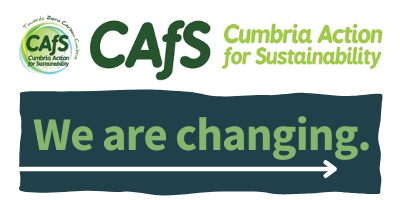This is the second half of our blog exploring the new government’s key ‘green’ policies – and what they could mean for Cumbria.
Energy Efficiency
- An extra £6.6bn in home energy efficiency improvements
This could be good news for Cumbria, where we have a lot of draughty, damp housing stock in dire need of upgrading. Carbon emissions from energy use in residential and commercial buildings in Cumbria are estimated to be around 1.5 MtCO2 equivalent and need to be reduced by more than 95% by 2037. [See the report here] Supporting home energy efficiency and helping households save money on their energy bills through our Retrofit Made Easy and Cold to Cosy Homes projects are important areas of CAfS’ work. Not just because heating our homes is a significant cause of carbon emissions, but also because levels of fuel poverty in Cumbria are shockingly high. However, funding is desperately needed to incentivize the upgrading of home insulation and heating systems. The Zero Carbon Cumbria Partnership ‘Buildings’ sector group has looked in detail at our buildings stock and set out the pathway to zero emissions, read the Emission Reduction Action Plan here.
Green Skills
- Will invest £1.5bn per year in ports, hydrogen and industrial clusters. Creating thousands of jobs focused on decarbonisation
- £1.5bn to new gigafactories (a manufacturing facility associated with electrification and decarbonisation)
Our report on the potential for green jobs in Cumbria – highlighted the opportunity to bring economic and social benefits to communities across the county. It highlighted that investment is needed and that significant resource savings in the longer term can be made by businesses decarbonizing. We know from our work with employers and schools through the C for LP’s Dream Placement programme, that school leavers are hungry for green careers and want access to training and job opportunities. To help them, we recently launched our new green skills web hub. The question remains as to how these manifesto proposals benefit Cumbria.
Transport
- A long-term strategy for transport, focus on aviation and sustainable aviation fuels
Carbon emissions from transport accounts for almost a quarter of Cumbria’s total, exacerbated by private vehicle use being the only option for many to access crucial services and jobs. Investment in local ‘active transport’ infrastructure, better public transport links and more opportunities and incentives for visitors to Cumbria to make use of low-carbon alternatives have been highlighted by the Transport and Mobility sector group of the Zero Carbon Cumbria partnership. Local sustainability groups are also taking action – with projects such as the Staveley EBike rental scheme and the community led Ullswater Hopper bus proving popular and being inspirational for other areas. We want to see the promised long term strategy put zero carbon at the heart of plans.
North sea oil and gas
- Maintain a strategic reserve of gas power stations to guarantee security of supply and ensure a phased and responsible transition in the north sea.
Our patron, Professor Mike Berners-Lee set out very clearly the problem at the heart of the climate crisis in his book ‘The Burning Question’ – which is that we must “leave fuel worth trillions of dollars in the ground”. Whilst at CAfS we are doing all we can to help reduce Cumbria’s use of polluting fossil fuels, this is simply not enough. The extraction and supply of fossil fuels must be stopped.


